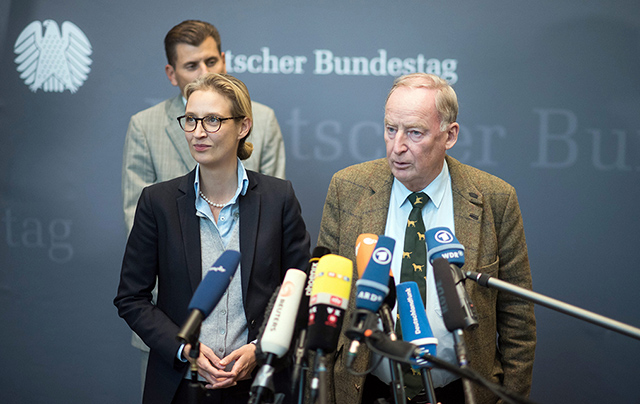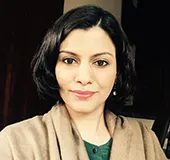-
CENTRES
Progammes & Centres
Location
When Germany headed to the polls on 24 September, there was little doubt that Merkel was poised for a comeback. As the election results began to pour in, it was clear that this was far from the victory Merkel had hoped for.

Image Source: PTI
Did Chancellor Angela Merkel's decision to open Germany's doors to migrants cost her heavily in the German election? That is the key question at the heart of the debate and discussion around the polls held on last Sunday, which saw the dramatic entry of the far right into the Bundestag or the German Parliament.
When Germany headed to the polls on 24 September, there was little doubt that Merkel was poised for a comeback. There was no real opposition to the Chancellor in the months leading up to the election, as she kept her campaign focused on the positives — the state of the economy, low unemployment and social stability. It was described as boring election by many, but has turned into one of the most intriguing outcomes we have seen.
As the election results began to pour in, it was clear that this was far from the victory Merkel had hoped for. The dramatic rise of the far right AfD (Alternative for Germany) has come as a warning that Germany may be taking a dangerous turn to the right. The AfD’s rhetoric is strongly anti-Muslim and anti-migrant, taking on a more shrill tone over the years since it was founded in 2013. The AfD had campaign posters with messages like “Burqas? We like bikinis”. The party also believes Germany should stop atoning for the past. Many have compared the AfD to the Nazis.
The party, only five years old, emerged from nowhere, entering the German parliament for the very first time with 13% of the vote share and more than 90 seats in the 709 member house. It is now Germany’s third largest party. Merkel’s Christian Democratic Union suffered it’s worst performance since 1949 with 246 seats, down 65 seats from the last election in 2013. Proving that this was a rather unconvincing win for “Mutti” or “Mummy”.
It is particularly worrying, given that with it’s historic background, Germany has infact resisted the rise of the ultra right for decades, even while we saw it’s rise in Europe. Understandably, the German media’s entire discourse currently is focused on the fallout of this landmark election.
The country’s leading TV network, DW, writes:
The far-right AfD will be the third-largest party in the Bundestag. This will have no immediate effect on policy per se, but will alter the political tone. In a nutshell: Things are about to get a lot nastier.
DW goes on to quote one of the country’s leading academics, Oskar Niedermayer, who says: “The spectrum of positions represented in the AfD cannot be summed up by one word. I call them a nationalist-conservative party with increasing connections to right–wing extremism.”
Since 2015, Angela Merkel has allowed over 1.3 million refugees to enter Germany, coming from countries like Syria, Afghanistan, Iraq. She had said this was the country’s “humanitarian duty”.
There were clearly those who backed Merkel’s move as a humanitarian one but as Der Spiegal writes, “

It is fairly evident now that this election saw a huge swathe of voters who were angered by Merkel’s migration policy, and much like the Brexit vote in the UK, lashed out at the establishment. That is precisely the focus of the German media which is trying to understand the AfD’s agenda and it’s appeal. DW says it is the “fear of and hostility toward those considered foreigners.”
A piece in the Welt says that Merkel is being roundly blamed for everything.“Merkel was the main contributor to the strengthening of the AfD, is the tenor of the criticism,” writes Richard Herzinger. “Comparisons of the Merkel regiment with dictatorial regimes.. are no longer confined to radical circles, but now belong to the repertoire as serious commentators and mainstream politicians,” he writes, going on to say that “to turn Merkel into a scapegoat is evidence of an inverse authority of authority, and directs comfortably from the disturbing fact that no political force, no intellectual enlightener, no civil society initiative has so far provided a conclusive answer on how to halt the rise of legal nationalists.”
That Merkel is facing considerable criticism is reflected elsewhere in the media space.
Der Spiegal writes: “For Merkel, who decided to run for a fourth term as chancellor last November, the Alternative for Germany's (AfD) rise is no less than a debacle. With her choice to run, she decided to follow in the footsteps of Helmut Kohl, who governed the country for sixteen years. Now the obvious question is whether Merkel made the same mistake that Kohl made in 1994 when he decided to try to carry on as chancellor? At the time, any shrewd member of the CDU knew that Kohl had fallen behind the times. But no one dared rebel against the elder politician. Is history now repeating itself? Merkel's campaign laid bare all the problems with her as a person and with the way she leads. Merkel long seemed to hover above everything as a kind of nonpartisan chancellor — which helps explain why many Germans didn't have any strong feelings about her. But that has changed fundamentally since the refugee crisis.”
A column in Der Spiegal sums up the German mood. “It is the arrogance of the power that led the CDU so far down, not the wrong program or the wrong Internet strategy. Arrogance is more difficult to correct than a faulty programme.”
The views expressed above belong to the author(s). ORF research and analyses now available on Telegram! Click here to access our curated content — blogs, longforms and interviews.

Nidhi Razdan is an award winning journalist and author currently Executive Editor with NDTV where she has worked for over 18 years. Nidhi reports on ...
Read More +